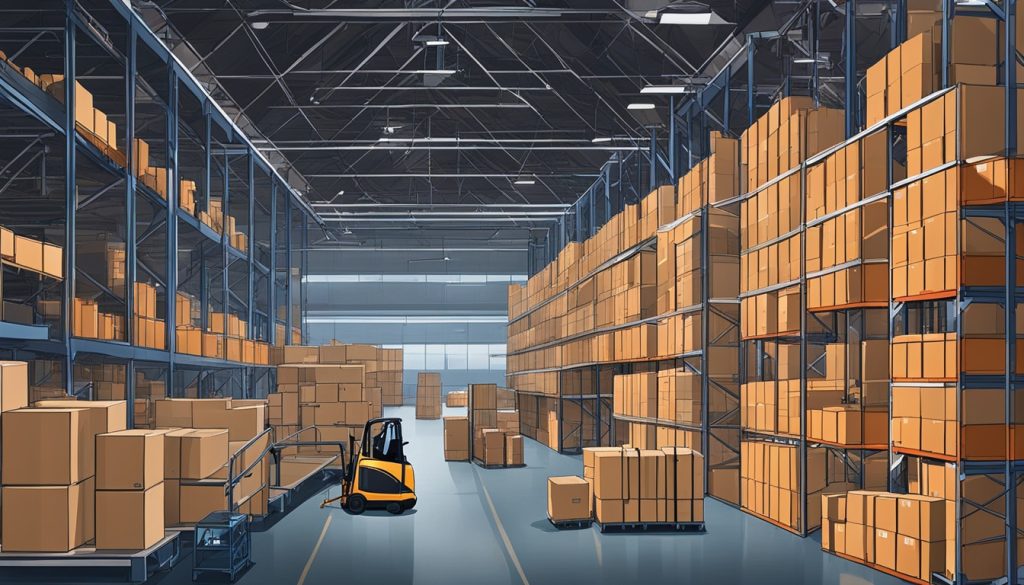Introduction to 5G Technology in Logistics
The advent of 5G technology marks a significant leap in connectivity, poised to revolutionise logistics and supply chain sectors. The integration of
5G technology in supply chain operations offers numerous benefits, including enhanced speed, reliability, and efficiency in real-time data processing. This technological leap ensures
logistics digital transformation is not only feasible but highly effective.
Private 5G networks are crucial for modern logistics operations, providing high-speed, low-latency communication essential for efficient management. A staggering 96% of logistics and warehouse decision-makers are either accelerating their modernisation projects or planning to do so within the next year. This surge in activity underscores the sector’s dedication to harnessing the benefits of
Accelleran Private 5G solution to tackle operational challenges.
The impact of 5G technology is profound in inventory management, where 5G barcode scanners swiftly log and track products, significantly reducing errors. Moreover, 5G-powered wearable devices monitor health vitals and environmental conditions, ensuring a safe working environment in logistics centres.
Autonomous mobile robots (AMRs) have been shown to enhance productivity in warehouse operations, a sentiment shared by 83% of associates. Furthermore, 83% of decision-makers and 89% of associates believe automation, augmented with supportive software and devices, is the optimal approach. This sentiment aligns with the overarching goal of
logistics digital transformation, which 5G is making increasingly attainable.
Organisations such as
Accelleran are driving this transition with innovative 5G solutions. Field teams greatly benefit from private 5G networks, ensuring seamless transitions to digital systems through real-time tracking and updates. As these advancements continue, the logistics and supply chain sectors are set to enter an era of unprecedented efficiency and accuracy, driven by the robust capabilities of 5G technology.
The Role of Connectivity Solutions for Logistics
The advent of 5G technology marks a pivotal shift in the logistics sector, offering enhanced efficiencies, automation, and real-time data processing. This transition from 4G to 5G is crucial, given the
advanced logistics technology and real-time data logistics demands.
Advantages of 5G over Previous Generations
5G technology brings substantial improvements over its predecessors, notably in speed and connectivity. Companies like Amazon and Rolls-Royce are capitalising on these advancements for efficient data transfer. This technology directly boosts logistics efficiency, leading to reduced fuel consumption and emissions, thus promoting sustainability. Vodafone’s 5G trials at Birmingham New Street station showcase the technology’s real-world benefits, adjusting services to passenger activity.
Accelleran has enabled
autonomous logistics solutions and IoT applications through 5G’s high-speed data transfer and real-time exchange capabilities. This technology empowers IoT devices and significantly advances automation in logistics. The leap in technology ensures seamless interactions between manufacturers, warehouses, carriers, and consumers.
Impact on Real-time Data Processing
5G’s impact on logistics is profound, especially in
real-time data logistics. It enables real-time asset tracking and advanced security, transforming logistics into a more efficient and secure domain. The Port of Livorno’s digitally connected harbour, equipped with cameras, sensors, and devices, drives operational efficiencies and ensures visibility of goods throughout their journey. Similarly, the Zeebrugge port’s 5G-ready network showcases improved operational performance through advanced connectivity.
The 5G Logistics project, funded with £5.2 million and involving 12 partners, demonstrates a commitment to innovative logistics solutions using 5G for real-time data processing and interconnectivity. This technology enhances efficiency and precision, enabling advanced robotics and IoT devices to manage inventory, sorting, and order packing with unprecedented coordination.
5G Private Networks in the Logistics Sector
The logistics sector is rapidly adopting 5G private networks as a key part of its infrastructure. This shift is driven by the need for connectivity solutions tailored to logistics operations. With 5G private logistics networks, companies can ensure seamless and secure communication. This is essential for maintaining operational efficiency and reliability. These networks support applications like real-time tracking and automated reporting, significantly boosting productivity.
Private networks for logistics operations provide a flexible and scalable solution. An Ericsson study suggests that 5G-enabled private networks can cut operational costs for logistics companies by 30%. Deloitte estimates that the industry could save up to $1.5 trillion globally by using IoT solutions on private networks for secure communication. This highlights the significant financial benefits and efficiency gains from adopting such technologies.
The evolution of private networks in logistics is influenced by megatrends like automation and robotics, data analytics, predictive maintenance, and cybersecurity concerns. These factors drive the demand for 5G private logistics networks, highlighting their pivotal role in the logistics domain. With the digital twin market expected to grow over 35% CAGR from 2021 to 2027 by DHL, 5G networks will continue to drive innovation and efficiency in logistics.
Logistics Digital Transformation with 5G and IoT
The fusion of 5G and IoT is transforming logistics into a realm of unparalleled efficiency and automation. By 2030, an estimated 49 million 5G connections are anticipated in manufacturing and industrial settings worldwide, showcasing the swift uptake of high-speed networks in logistics. This shift is set to yield around US$2.4 billion in global revenue for suppliers, highlighting the economic impact of 5G on the sector.
Integration of IoT in Logistics
The advent of 5G networks is revolutionising logistics by integrating IoT. Accelleran’s technology enables connectivity for a multitude of devices and sensors, supporting automatic vehicle guidance, drone operations, and smart warehousing. This ensures logistics operators can adapt quickly to market changes, thereby propelling digital transformation in their supply chains.
Enhanced Automation and Efficiency
5G and IoT are crucial for boosting
logistics automation and efficiency. Predictive analytics is increasingly being used to optimise and forecast supply chain operations, heralding a shift towards data-driven decision-making in logistics. Robotics are also advancing rapidly, offering automation for complex tasks, thus enhancing operational efficiency and improving working conditions for humans. The adoption of cloud-based technologies for inventory management is further boosting efficiency, enabling real-time inventory tracking and management from anywhere.
Advanced Logistics Technology and Wireless Networking Solutions
The logistics sector is undergoing a significant transformation, thanks to
advanced logistics technology and innovative wireless networking solutions. Accelleran’s 5G package is pivotal in this evolution, offering high-capacity and low-latency communication essential for next-generation logistics. The use of autonomous robots in smart warehouses exemplifies these advancements.
Ports, airports, and warehouses are at the forefront of adopting private LTE and 5G networks, showcasing their readiness for modern integration. Transportation hubs and logistics sites are now key targets for private wireless vendors, aiming to provide comprehensive solutions. These locations feature complex network infrastructures that integrate IoT and automation systems for seamless operations. The demand for private networks in transport is driven by both national and global shifts.
There is a growing need for applications that require high-bandwidth, predictable latency, robust security, and consistent uptime. These requirements are vital for the
advanced logistics technology used in modern supply chains. For instance, Accelleran’s Private 5G package ensure secure and resilient communications, making logistics operations efficient and reliable.
Railway stations, aviation manufacturers, and highway agencies show varying interest in
wireless networking solutions for logistics. However, the need for high-capacity, low-latency, and secure wireless networks is a common priority. The integration of 5G and Wi-Fi 6/6E with existing connectivity frameworks is becoming crucial for seamless operations across different sectors.
The FCC’s new rules for wireless broadband operations in mm-Wave bands in the United States have set a precedent for
next-generation 5G wireless deployment, paving the way for widespread implementation of
wireless networking solutions for logistics. Over 180 industry professionals recently convened to discuss the future of shared spectrum, further highlighting the collaborative efforts to enhance wireless services in logistics. Discussions led by Senza Fili Consulting have provided valuable insights into the trends shaping the wireless technology landscape, propelling the sector towards more innovative solutions.
These technological advancements highlight the crucial role of Accelleran Private 5G solution in achieving an efficient, automated logistics infrastructure. As the industry continues to evolve, the integration of
advanced logistics technology and wireless networking solutions will remain essential.
Practical Applications of 5G in Supply Chain Management
The integration of
5G in supply chain management is transforming logistics. It brings real-time visibility and monitoring through advanced
asset tracking 5G solutions. These innovations are significantly improving the efficiency and transparency of logistical operations. This leads to more informed decision-making and better use of resources.
Asset Tracking and Management
5G’s key application in supply chain management is
asset tracking 5G. This technology enables real-time monitoring of assets throughout the supply chain. It uses improved coverage in indoor environments and extensive coverage in densely populated areas. This gives organisations superior visibility at every stage of the supply chain.
The Port of Felixstowe has implemented the “5G Ports” project. This project enhanced the performance of remote control yard cranes, leading to increased efficiency and 24/7 operations. Similarly, the Port of Busan reported a 40% increase in yard productivity by automating its fleet of cranes over 5G.
Autonomous Drones and Robotics
Autonomous logistics drones and robotics, supported by robust 5G networks, are changing inventory audits, security surveillance, and the transportation of goods. At the Port of Tianjin and the Port of Qingdao, automated ship-to-shore cranes operating over a 5G connection have significantly improved loading and unloading accuracy.
Advancements in autonomous ground vehicles for loading and unloading operations at the Rotterdam and Livorno ports are also notable. They focus on operational efficiencies and personnel safety. By leveraging these technologies, the logistics sector can achieve unprecedented levels of efficiency and security.
Case Studies and Pilot Projects
Various
5G case studies and
logistics pilot projects have shown the transformative potential of fifth-generation technologies in logistics. For instance, the use of geofenced asset tracking at ports has optimised operations by offering real-time visibility. This has reduced risks associated with logistics management. Reports suggest that 5G can improve supply chain visibility and reduce risks, tackling major industry challenges. The implementation of Accelleran technology at logistics centres has introduced autonomous mobile robots, revolutionising warehouse management through increased automation and efficiency.
The 5G-LOGINNOV project is a key initiative, using the GUEST methodology to assess market potential and encourage innovation among new entrants like startups and SMEs. These pilot projects aim to tailor solutions and services to the real needs of stakeholders, as surveys have shown. Moreover, significant investments have been crucial for these initiatives. For example, £29 million was invested in the initial portfolio of 5G Testbeds and Trials projects by March 2020. The Urban Connected Communities Project also received over £20 million for a large-scale 5G pilot in the West Midlands region, including Birmingham, Coventry, and Wolverhampton.
The UK’s commitment to advancing 5G technologies is clear across various sectors. Around £6 million was allocated for Industrial 5G Testbeds and Trials to focus on use cases like connected precision manufacturing and real-time data analysis. Additionally, the Rural Connected Communities Project invested £30 million in seven 5G R&D projects across rural areas, promoting connectivity and innovation. These investments underscore the importance of 5G technologies in driving the digital transformation of logistics and other sectors.
In conclusion, these case studies and pilot projects highlight the significant impact of 5G on logistics. Organisations like Accelleran are showcasing their technology implementation. The ongoing projects and substantial investments offer promising insights into how 5G can revolutionise logistics and supply chain management. This will make operations more efficient, secure, and data-driven.
Challenges and Considerations in Implementing Private 5G Solutions
Deploying private 5G solutions in logistics is not without its challenges. Key concerns include the need for extensive infrastructure and ensuring strong security and privacy. These are essential for a successful implementation.
Infrastructure Requirements
The setup and maintenance of private 5G solutions require significant investment. For instance, the cost of private 5G networks is expected to grow at a 42% annual rate from 2024 to 2027, reaching nearly $3.5 billion by 2027. China leads in adopting 5G private networks, covering vast areas. Projects like Midea’s Jingzhou industrial park and WISCO underline the financial and operational efforts needed. It’s vital to design the 5G infrastructure to suit the logistics sector’s needs, ensuring connectivity, low latency, and scalability.
Security and Privacy Concerns
Security and privacy are critical when
setting up private 5G networks. The increasing number of connected devices raises the risk of data breaches, making the protection of logistics data crucial. The Liverpool 5G Create network in Kensington shows how strong security can lead to cost savings, like reduced WAN connectivity charges and lower costs for care homes. To ensure privacy, it’s essential to implement enhanced security measures and update protocols regularly to prevent breaches and unauthorised access. Accelleran’s expertise in secure and scalable infrastructure helps organisations overcome the risks of private 5G deployment.
By addressing the challenges of 5G infrastructure and prioritising privacy, organisations can successfully implement private networks. This approach ensures the complexities of private network deployment are managed effectively.
Conclusion
The emergence of 5G private networks heralds a transformative era for logistics, promising unprecedented innovation, efficiency, and growth. These networks could slash operational costs by up to 30%, as per an Ericsson study, indicating substantial financial benefits and operational enhancements. The integration of IoT, augmented reality, and artificial intelligence is set to revolutionise logistics, ensuring greater operational agility and supply chain transparency. BMW’s adoption of private 5G networks exemplifies the profound impact of these technologies on manufacturing processes.
Accelleran’s contribution to building Private 5G networks in logistics is crucial. As a frontrunner in advanced connectivity solutions, Accelleran is instrumental in defining the
future of logistics with 5G. Their solutions empower organisations to establish robust 5G networks, facilitating real-time data processing, remote operations, and supporting high device densities. The adoption of digital twins, expected to boost efficiency by 10%, and the deployment of private 5G networks in the Port of Rotterdam and Hamburg, highlight the tangible benefits of these technologies in logistics.
The
future of logistics with 5G looks bright, with ongoing technological advancements set to redefine the sector. Companies like Accelleran are leading the charge, equipping the logistics industry to remain competitive and innovative. As the global landscape evolves, embracing 5G private networks will undoubtedly enhance supply chain management, operational efficiencies, and economic outcomes. The synergy and technological progress in case studies and pilot projects signal the logistics sector’s readiness to leverage these opportunities, propelling it into a future where 5G is pivotal to its success.
FAQ
How are 5G private networks accelerating innovation in the logistics sector?
5G private networks are revolutionising logistics by enabling real-time tracking of assets and the use of autonomous drones for surveillance. They also provide enhanced connectivity solutions. Companies like Accelleran are leading this transformation with their cutting-edge 5G infrastructure.
What is the role of 5G technology in supply chains?
5G technology is transforming supply chains by improving connectivity and data rates. This allows for real-time data processing, precise inventory management, and increased automation. Such advancements are crucial for meeting the demands of online shopping and modernising supply chains.
What are the advantages of 5G connectivity solutions for logistics over previous generations like 4G?
5G surpasses 4G with its superior data rates, low latency, and robust connectivity. These features are vital for advanced applications such as autonomous logistics and IoT. They significantly enhance real-time asset management and operational efficiency.
How do 5G private networks benefit logistics operations?
5G private networks offer bespoke connectivity tailored to logistics needs. They support real-time tracking, automated reporting, and coordinated robotic operations. These networks ensure secure, reliable communication, which is essential for modern logistics.
How is IoT integrated into the logistics sector with 5G technology?
IoT devices and sensors, powered by 5G networks, collect and process data in real-time. This supports automatic vehicle guidance, drone operations, and intelligent warehousing. The integration of IoT with 5G leads to enhanced efficiency and faster response times in logistics.
What role does advanced logistics technology and wireless networking solutions play in the sector?
Advanced logistics technology and wireless networking solutions, enable high-capacity, low-latency communication. These are crucial for applications like smart warehouses and sophisticated tracking mechanisms. They optimise and automate logistics infrastructure.
How is 5G technology applied practically in supply chain management?
5G technology is applied practically in supply chain management through enhanced asset tracking with real-time visibility and autonomous drones for inventory audits and security surveillance. Accelleran’s Private 5G solutions enable these advancements.
Are there any case studies or pilot projects demonstrating the impact of 5G in logistics?
Yes, numerous case studies and pilot projects highlight the effectiveness of 5G technologies in real-world logistics. For instance, geo-fenced asset tracking in ports and autonomous mobile robots in warehouses have been successfully implemented. Companies like Accelleran have been key in these implementations.
What are the challenges and considerations in implementing private 5G solutions in logistics?
Implementing private 5G solutions requires significant infrastructure setup, ongoing maintenance, and ensuring scalable and secure networks. Security and privacy are major concerns, requiring robust protocols to protect logistics data.




